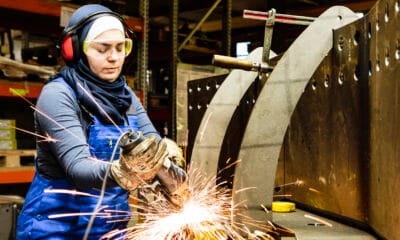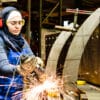Canada Jobs
Academy Canada is hiring Multiple Candidates For Welding Instructor to start in October 2023 – St. John’s, NL

Job details
Location: St. John’s, NL
Salary: CA$33K-CA$108K (Employer EST.)
Job type: Full Time , Part time
Shift/Hours: Morning, night, overnight
The ideal candidate will have a minimum of six years combined education and work experience and have a Red Seal designation for at least two years. You have a passion for your industry and you are a dedicated professional. You pay great attention to detail and you have the ability to manage tasks while being very organized.
You have a high degree of integrity, honesty and the passion to teach others. You are able to work independently but also enjoy a cooperative team environment. As an excellent communicator with superb interpersonal skills you are looking for a rewarding opportunity.
A certificate of conduct/vulnerable sector check is required upon hire.
Job Type: Full-time
Schedule:
- Monday to Friday
Work Location: In person
Application deadline: 2023-08-19
Expected start date: 2023-10-05
What skills and qualities are important for a Welder?
Being a welder requires a combination of technical skills, physical abilities, and personal qualities. Here are some important skills and qualities for a welder:
1. Technical Skills:
– Welding Techniques: Proficiency in various welding processes such as MIG (Metal Inert Gas), TIG (Tungsten Inert Gas), Stick welding (SMAW), and Flux-Cored Arc Welding (FCAW).
– Blueprint Reading:Ability to interpret technical drawings and welding symbols to accurately execute welds as per specifications.
– Material Knowledge: Understanding the properties and characteristics of different metals and alloys to choose the appropriate welding method and settings.
– Operational Knowledge: Familiarity with welding equipment, machinery, and tools, including electrode holders, welding torches, and protective gear.
2. Physical Abilities:
– Hand-Eye Coordination: Precise control of the welding torch or electrode holder requires excellent hand-eye coordination.
– Stamina:Welders often work in physically demanding positions for extended periods, requiring good endurance.
– Manual Dexterity: Ability to manipulate small parts and tools while maintaining accuracy and precision.
– Visual Acuity:Strong vision is crucial for monitoring weld quality and ensuring proper alignment.
3. Safety Awareness:
– Safety Protocols: Strict adherence to safety guidelines, including wearing appropriate personal protective equipment (PPE) such as welding helmets, gloves, and flame-resistant clothing.
– Fire Prevention: Understanding of fire hazards and prevention methods to ensure a safe working environment.
– Ventilation Knowledge:Awareness of proper ventilation practices to avoid inhalation of harmful fumes and gases.
4. Attention to Detail:
– Precision: The ability to execute welds with a high degree of accuracy, especially when working on critical structural components.
– Quality Control: Regularly inspecting welds for defects and making necessary adjustments to ensure the highest quality work.
5. Problem-Solving Skills:
– Adaptability: Being able to adjust welding techniques and settings based on changing conditions or unexpected challenges.
– Troubleshooting: Identifying and resolving issues with welding equipment or weld quality in real-time.
6. Mathematical and Mechanical Aptitude:
– Measurement: Using measurement tools accurately to ensure proper dimensions and alignment.
– Basic Math: Performing calculations related to material quantities, angles, and dimensions.
7. Communication Skills:
– Collaboration: Effectively communicating with other team members, engineers, and supervisors to understand project requirements.
– Documentation: Keeping accurate records of welding processes, materials used, and any issues encountered.
8. Work Ethic and Attitude:
– Attention to Safety: A strong commitment to personal and co-worker safety.
– Reliability: Being punctual and dependable in meeting project deadlines and work schedules.
– Problem Solving: A proactive approach to resolving challenges and improving work processes.
9. Physical and Mental Endurance:
– Working Conditions: The ability to work in challenging environments, such as confined spaces, heights, or adverse weather conditions.
– Resilience: Handling the physical demands of the job and being mentally prepared for repetitive tasks.
10. Continuous Learning:
– Industry Knowledge: Staying up-to-date with the latest welding techniques, technologies, and industry trends.
– Skill Enhancement: Willingness to learn new welding processes and refine existing skills.
Remember, becoming a skilled welder takes practice, dedication, and a commitment to ongoing improvement.
Who can apply to this job?
The employer accepts applications from:
- Canadian citizens and permanent or temporary residents of Canada.
- Other candidates with or without a valid Canadian work permit.
How to apply
Online: Apply On Company WebSite
What education and certification are required to become a Welder?
The educational and certification requirements to become a welder can vary based on factors such as the type of welding, industry, and location. In many cases, formal education is not always mandatory, but it can significantly enhance your skills and job prospects. Here’s a general overview:
- High School Diploma or Equivalent: Having a high school diploma or GED is usually the minimum educational requirement for entry-level welding positions. While not strictly mandatory, a strong educational foundation can help you understand basic math, reading blueprints, and using measurement tools.
- Vocational or Technical Training: Many aspiring welders opt to enroll in vocational schools, community colleges, or technical institutes that offer welding programs. These programs provide hands-on training and instruction in various welding techniques, safety practices, blueprint reading, and metallurgy. They often result in certificates or diplomas and can vary in duration from a few weeks to several months.
- Apprenticeship Programs: Apprenticeships are a combination of on-the-job training and classroom instruction. They are usually sponsored by employers, labor unions, or trade associations. Apprenticeships offer a more comprehensive learning experience and often lead to a journeyman-level certification upon completion. These programs can last a few years, during which you’ll receive a stipend or wage while learning the trade.
- Certifications: While certifications aren’t always mandatory, they can greatly enhance your employability and earning potential as a welder. Certifications demonstrate your proficiency in specific welding techniques and adherence to industry standards. Some common certifications include:
- American Welding Society (AWS) Certifications: AWS offers a range of certifications for different welding processes and positions, such as Certified Welder (CW), Certified Welding Inspector (CWI), and Certified Welding Educator (CWE).
- ASME Welding Certifications: The American Society of Mechanical Engineers offers certifications for welding processes used in industries like pressure vessel fabrication.
- API Welding Certifications: The American Petroleum Institute offers certifications for welding related to the oil and gas industry.
5. Specialized Training: Depending on the industry you intend to work in, specialized training might be required. For example, if you plan to work on pipelines or in aerospace, specific certifications and training related to those sectors might be necessary.
6. Continuous Learning: The field of welding is always evolving with new techniques and technologies. To stay competitive and up-to-date, it’s important to engage in continuous learning. Attending workshops, seminars, and keeping track of industry developments is essential for a successful welding career.
Remember that requirements can vary by region and industry, so it’s a good idea to research the specific requirements in your area and the sector you’re interested in pursuing. Additionally, networking within the industry and seeking advice from experienced welders can provide valuable insights into the necessary steps for your career path.
What is the work environment like for Welder?
The work environment for welders can vary widely depending on the industry, type of welding, and specific job roles. Here are some common work environments that welders might experience:
- Manufacturing and Fabrication Shops: Many welders work in manufacturing and fabrication shops where they create metal products, components, and structures. These environments can range from small workshops to large industrial facilities. Welders in these settings often work on assembly lines or in designated workstations to produce items like machinery parts, metal furniture, and structural components.
- Construction Sites: Welders are essential in the construction industry for tasks like joining steel beams, fabricating structures, and assembling frameworks. Construction sites can vary from commercial buildings to residential developments and can involve outdoor work in various weather conditions.
- Automotive and Aerospace Industries: Welders in these industries work on manufacturing vehicles, aircraft, and related components. They may be involved in precision welding for critical parts, ensuring the safety and reliability of the end products.
- Shipbuilding and Maritime Industry: Welders working in shipyards are responsible for constructing and repairing vessels. This environment can involve working on large structures, often outdoors and in proximity to water.
- Energy and Oil/Gas Industry: Welders in these industries work on pipelines, refineries, and other energy-related structures. These environments can be challenging due to safety regulations and the need to prevent leaks and failures.
- Repair and Maintenance Shops: Welders specializing in repair work may find themselves in various environments, from fixing machinery in factories to repairing equipment at mining sites or agricultural facilities.
- Field Work: Some welders work in the field, where they travel to different locations to perform welding tasks. This could involve working on infrastructure projects, performing maintenance, or repairing equipment on-site.
- Confined Spaces: In some cases, welders may need to work in confined spaces like tanks, boilers, or pipelines. This requires adherence to strict safety protocols and the ability to work comfortably in tight spaces.
- Indoor and Outdoor Work: Depending on the industry and project, welders might work indoors, outdoors, or a combination of both. Outdoor work can expose welders to varying weather conditions.
- Safety Considerations: Safety is paramount for welders. They must wear appropriate personal protective equipment (PPE) such as helmets, gloves, flame-resistant clothing, and safety glasses. Proper ventilation and fume extraction are also essential to prevent inhalation of hazardous fumes.
- Team Collaboration: Welders often work as part of a team alongside other tradespeople, engineers, and project managers. Effective communication and collaboration are important for ensuring projects run smoothly.
It’s important to note that the work environment for welders can be physically demanding and potentially hazardous. Proper training, safety awareness, and adherence to safety protocols are crucial for a successful and safe welding career.
Latest Job Openings From Careerjet
Caregiver
Company: Assisting Hands of Ottawa
Location: Ottawa, ON
Salary: $18 - 22 per hour
How to Apply: Apply on company website
Source: Careerjet (www.careerjet.ca)
Security Attendant I
Company: City of Vancouver
Location: Vancouver, BC
Salary: $27.04 - 31.66 per hour
How to Apply: Apply on company website
Source: Careerjet (www.careerjet.ca)



